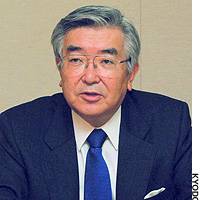The Industrial Revitalization Corp. of Japan will try to help rehabilitate at least 100 financially troubled companies during its planned five years in operation, the IRCJ chief said Thursday in an interview with Kyodo News.
"We intend to aim at a minimum triple-digit number (of companies) so that our operations will have an impact on Japan's industrial structure," said Atsushi Saito.
The corporate revival body, which began operations in May, has just picked an initial group of four companies it will try resuscitate.
They are condominium builder Dia Kensetsu Co.; Kyushu Industrial Transportation Co., the largest bus operator in Kumamoto Prefecture; Usui department store in Koriyama, Fukushima Prefecture; and Mitsui Mining Co.
The IRCJ has vowed to mediate the conflicting interests of creditor banks, which often number dozens per debtor, and get them all to agree to a restructuring plan that includes substantial debt waivers.
But financial institutions, especially major banks, are generally less enthusiastic about utilizing the government-backed entity for corporate revival.
Saito said the government needs to do more to boost IRCJ operations, such as providing tax incentives to banks when they unload bad assets.
He also said the IRCJ will accept corporate resuscitation requests from any creditors, including the parent companies of ailing subsidiaries.
"(Requests) can be filed by the parent company, which has extended loans" to a struggling subsidiary," he said. "It doesn't have to be a bank."
He said the IRCJ may also salvage financially troubled joint ventures between local governments and private firms.
Saito said the local governments "should be primarily responsible" for the financial trouble at such joint ventures, but the IRCJ "will not consider it taboo" for the entity to try to turn them around.



